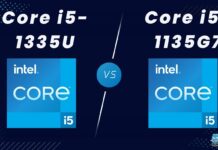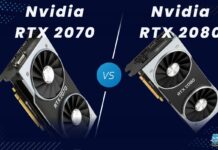Intel Core i7 14700K
Rated: 7/10
Intel Core i5 13600K
Rated: 8/10
Pros & Cons
| CPU | Pros | Cons |
|---|---|---|
| Core i5 13600K | ✅Lower power consumption ✅Lower cost | ❌Lower performance |
| Core i7 14700K | ✅Significantly better performance | ❌Almost no improvements over last year's model ❌High price |
Key Takeaways
- In our testing, the Core i7 14700K had around 11% better performance than its rival from the last generation, which is a rather small difference for being a tier higher in the Intel hierarchy and also a year newer.
- The power consumption of the i7 was also around 12% higher than the Core i5 13600K, reflecting the performance gains and indicating no betterment in power efficiency.
- As of late December 2023, the Core i7 14700K is around 50% more expensive than the Core i5 13600K, a high price tag for little improvement.
- The stagnation of Intel with the Core i7 14700K forces us to recommend the Core i5 13600K as a more reasonable processor for most consumers.
Specification Table
| Feature | Intel Core i7-14700K | Intel Core i5-13600K |
|---|---|---|
| Processor Base Power | 125 W | 125 W |
| Memory Types | Up to DDR5 5600 MT/s Up to DDR4 3200 MT/s | Up to DDR5 5600 MT/s Up to DDR4 3200 MT/s |
| Max Memory Size | 192 GB | 192 GB |
| Max Memory Bandwidth | 89.6 GB/s | 89.6 GB/s |
| Max # of Memory Channels | 2 | 2 |
| Processor Graphics | Intel UHD Graphics 770 | Intel UHD Graphics 770 |
| Graphics Base Frequency | 300 MHz | 300 MHz |
| Launch Date | Q4’23 | Q3’22 |
| Best RAM | Best RAM For i7-14700K | Best RAM For Core i5-13600K |
| Best CPU Coolers | Best CPU Coolers For i7-14700K | Best CPU Coolers For Core i5 13600K |
| Best Motherboards | Best Motherboards For i7-14700K | Best Motherboards For Core i5 13600K |
Architectural Differences
- Core Count: The i7 has a higher core count than its rival, with 8 performance cores and 12 efficiency cores that total 28 threads. The opposed has 14 cores, which comprise 6 performance cores and eight efficiency cores, which paint it as significantly less powerful. The total for this processor comes to 20 threads.
- Clock Speed: The Core i5 13600K frequency range is from 2.5GHz to 5.6GHz, whereas the Core i5 has a range from 2.6GHz to 5.1GHz, which does not help its lower core count.
- Process Node: The Core i7 14700K uses outdated 10nm processing nodes, which is one aspect in which the 13600K matches it.
- TDP: The PL2 TDP on the Core i7 14700K is around 253 watts, which is significantly higher than the 181 watts the Core i5 13600K is rated for.
- L3 Cache: The cache size of the Core i7 is higher than that of the Core i5, at around 33 megabytes instead of the 24 megabytes of its rival.
- Memory: Both processors boast compatibility for both DDR4 (up to 3200Mz) and DDR5 (up to 5600MHz) memory.
The new 14th-gen processors barely accumulate any improvement over their 13th-generation counterparts, but do the improvements stack up across different models? The Core i7 14700K vs Core i5 13600K comparison will detail the difference in performance between these two chips.
Gaming Benchmarks – 1080p
To test these two chips to their fullest capacities, we created a test bench that leaves only the processors as the limiting factor. The specifications of the test bench used are written below:
Test Bench
- OS – Windows 11
- Mobo – MSI MAG Z790 Tomohawk DDR5
- RAM – XPG Lancer RGB 32GB 7200MT/s DDR5
- SSD – XPG GAMMIX S70 BLADE 2TB NVMe
- PSU – ENERMAX REVOLUTION D.F. X 1050W
- CPU Cooler – Arctic Liquid Freezer II 420 – AIO Water Cooler
- GPU – GIGABYTE RTX 4090 Gaming OC 24G
Baldur’s Gate 3

- The first game of our comparison had quite a difference between the performance of our two contenders. The i7 managed an average framerate of 153 FPS, which is 7% higher than the 143 FPS of the 13600K.
- There were only a few frames of difference between the two chips in terms of 1% lows, with the i5 getting around 125 FPS, while the i7 had a minimum framerate closer to 127 FPS.
Hogwarts Legacy

- The average framerate of the Core i7 was around 75 FPS in Hogwarts Legacy, which was around 8.7% higher than the 69 FPS that the i5 13600K could muster. Such a difference at these relatively low framerates can substantially change your gaming experience.
- The 1% lows were not great on either processor, with the i7 touching 50 FPS, while the i5 managed lows of only 40 FPS.
Starfield

- The average for the Core i7 14700K was 105 FPS in Starfield, while the average framerate of the Core i5 13600K was almost 12% higher at around 94 FPS.
- As for the lows, the 14700K hovered around 86 FPS, while the Core i5 13600K had a minimum framerate of around 80 FPS.
Cyberpunk 2077

- In the new Cyberpunk update, the Core 14700K managed an average framerate of 166 FPS, which is quite impressive against the 154 FPS average of its rival. Here, the difference accumulated to close to 8%.
- The 1% lows were no strangers to change either, with the 14700K hovering around 141 FPS for its minimums, while the Core i5 13600K managed to get minimums of around 130 FPS.
The Last Of Us Part 1

- The framerates were relatively high on both chips in our testing of The Last Of Us Part 1, with the Core i7 14700K averaging around 181 FPS, while the Core i5 13600K had an average framerate of 171 FPS, which is a difference of around 6%.
- As for the 1% lows, the Core i5 13600K managed to stick to around 141 FPS, while the Core i7 14700K was more stable with a minimum of around 168 FPS.
Star Wars Jedi Survivor

- The difference in performance between our two chips was smaller than what we’ve seen up till this point, with the Core i5 averaging a framerate of 151 FPS, while the i7 had an average of 158 FPS. The difference in this game was around 4.5%.
- The 1% lows were also close between the two processors, with the i5 getting 141 FPS for its minimums, while the framerates were around 146 FPS for the Core i7.
Spider-Man Remastered

- The delta was brought to a larger number in our test of this game, with the Core i5 having an average framerate of 136 FPS, while the Core i7 had an average of 149 FPS, which showed an advantage of around 9.5% for the i7.
- As for the lows, the Core i7 14700K had a minimum of around 126 FPS, while the Core i5 13600K managed to keep its minimum framerate around 119 FPS.
A Plague Tale Requiem

- The framerates were more or less equalized in our test of A Plague Tale Requiem, with the Core i5 13600K getting an average framerate of around 146 FPS, only two frames lower than the 148 FPS average of the Core i7 14700K.
- The lows kept the performance delta constant with the i5 getting a minimum of 133 FPS, while the Core i7 14700K had minimums of closer to 135 FPS.
Assassin’s Creed Mirage

- The average framerate of the Core i7 hopped around the 196 FPS mark in our run of Assassin’s Creed Mirage, while the Core i5 13600K had an average framerate of around 162 FPS, around 21% lower than that of the i7.
- The minimums were around 140 FPS on the Core i5, while the i7 managed to get 1% lows of around 163 FPS, reflecting the difference we saw in the average framerates.
Watch Dogs Legion

- The performance of Watch Dogs Legion was also quite different between the two processors, with the Core i5 13600K getting an average of around 132 FPS, while the Core i7 14700K averages a 25% higher framerate at an average of around 166 FPS.
- The 1% lows hung around 120 FPS on the i7, while the Core i5 had minimums of around 101 FPS.
Hitman 3

- Finally, Hitman 3 saw the average framerate of the Core i7 14700K skyrocketing to around 276 FPS, which is around 10% higher than the 251 FPS average that the Core i5 13600K had in our test of this game.
- As for the 1% lows, the 14700K managed to get around 254 FPS, while the Core i5 13600K dipped to around 223 FPS.
Overall Gaming Performance
Now that we have a general idea of the performance behaviors of these processors, this part of the Core i7 14700K vs Core i5 13600K comparison will deal with the average performance of these chips throughout ten games.
Average Framerate

On average, the Core i7 14700K delivered a framerate of 161 FPS in the games we tested at 1080p, while the Core i5 13600K could only manage a framerate of 146 FPS on average, leading to an 11% difference between the overall performance of these chips.
This big difference between the chips was very noticeable, and some games exaggerated the differences. The higher performance of the i7 can lend it the ability to perform more consistently for longer in its life cycle.
Here is a look into our testing phase for these processors:
1% Lows
The difference between the chips grew to 12% in terms of the 1% lows, with the i7 getting a median of 140 FPS, considerably higher than the 125 FPS that the Core i5 13600K got. As with the averages, the 1% lows were also very different between the two processors in some titles, while some maintained a relatively small delta.
Overall, there is no doubt that the Core i7 14700K performs significantly better than the Core i5 13600K, so much so that the Core i7 lives up to its name in performing a tier above what we saw from the 13600K.
The difference in performance between these processors can be somewhat jarring at lower framerates, but playing most games at higher resolutions will alliviate the CPU bottleneck we’ve enforced in our testing, leading to a less drastic difference between the two chips.
– Uzair Qureshi
Power Consumption
| Game | Core i7 14700K (W) | Core i5 13600K (W) |
|---|---|---|
| Baldur's Gate 3 | 505 | 468 |
| Hogwarts Legacy | 448 | 411 |
| Starfield | 571 | 440 |
| Cyberpunk 2077 | 597 | 546 |
| Last Of Us Part 1 | 645 | 571 |
| Star Wars Jedi Survivor | 534 | 491 |
| Spider-Man Remastered | 473 | 423 |
| A Plague Tale Requiem | 545 | 514 |
| Assassin's Creed Valhalla | 489 | 421 |
| Watch Dogs Legion | 525 | 477 |
| Hitman 3 | 588 | 528 |
| Average Power Consumption | 538 | 480 |
| Winner: Intel's Core i5 13600K | ||
Intel disappointed us once again with the power consumption on both fronts being very high, but still, the Core i7 managed to get an average total system power draw 12% higher than the Core i5 13600K, which reflects its higher performance, indicating almost no gains in power efficiency year over year.
The higher power consumption of these chips could make you get a better power supply to meet these high numbers, which will add to the cost of ownership. The power consumption will not be good for your power bill either.
Price And Value
| CPU | MSRP | Current Price |
|---|---|---|
| Core i7 14700K | 💲409 | 💲401 |
| Core i5 13600K | 💲319 | 💲268 |
| Price Difference | 28% | 50% |
As of late December 2023, the price of the Core i7 14700K is around 50% higher than that of the Core i5 13600K, which in of itself does not constitute great value, at least not on the new market.
Prices are subject to change as these processors live out their life cycle, so make sure to recheck the price of these chips whenever you are making your purchasing decision.
What We Recommend
Now that we have an idea of the performance and behaviors of the Core i7 14700K vs Core i5 13600K, this part of our discussion will detail the demographic of both of our contenders.
Core i7 14700K: The newest i7 from Intel has disappointed us through and through, bringing little performance benefits over the last generation of chips while refreshing the price to the original deal. The power consumption stays high, and so does the price. Considering that, it is very hard to recommend this processor, especially as Intel will outdo it with the new Core Ultra chips in the coming months.
Core i5 13600K: The last generation i5 has some merits. It performs adequately, though not as well as its i7 counterpart. It has a lower power consumption, which might fit the system of some users. The price is also substantially lower, making it a relatively capable budget processor.
If you are choosing between the two, we have no choice but to recommend the Core i5 13600K to most users due to its rival’s lack of innovation and effort.
Frequently Asked Questions
Intel will probably get back to its feet when they release the Meteor Lake (or Core Ultra) processors, though the success of these chips is also highly dependent on the price they are marketed at.
From the looks of it, Intel seems to have not brought many improvements with the 14th-gen processors aside from slightly higher clock speeds.
The iGPU performance of these chips should be relatively close due to the similarities in the overall architecture.
More From Intel Core i7 14700K
More From Intel Core i5 13600K
Thank you! Please share your positive feedback. 🔋
How could we improve this post? Please Help us. 😔
[Comparisons Specialist]
I’m a passionate computer hardware expert specializing in CPUs and GPUs. With a lifelong curiosity for hardware and extensive hands-on experience, I provide valuable insights, practical advice, and in-depth analysis on these components. Engaging with the hardware community, I exchange knowledge and stay at the forefront of technological advancements.
Get In Touch: uzair@tech4gamers.com


 Threads
Threads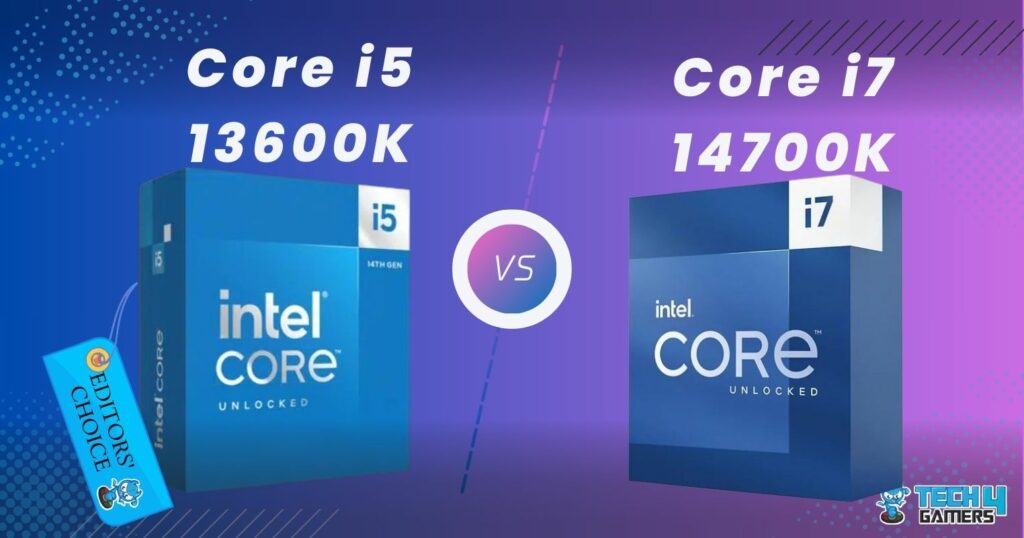

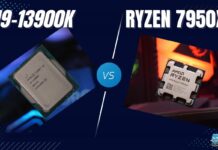
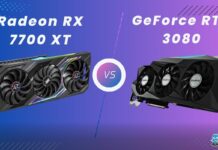
![RTX 4070 Ti Super Vs RTX 3080: Worth Upgrading? [Tested]](https://tech4gamers.com/wp-content/uploads/2024/02/RTX-4070-Ti-Super-vs-RTX-3080-218x150.jpg)
